Written by Alan Woods
Friday, 04 February 2011
The
masses have once again taken to the streets in the biggest
demonstrations yet seen in Egypt. They call it the "Day of Departure".
Already this morning Al Jazeera showed an immense crowd of people
thronging Tahriri Square. The mood was neither tense nor fearful, but
jubilant. The very instant Friday prayers finished the masses erupted in
a deafening roar of “Mubarak out!” The few Mubarak supporters who were
slinking on the streets outside the Square like impotent jackals could
do nothing.
The class dynamics of the Revolution
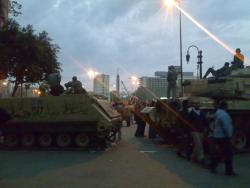 January 30th – Tanks in Tahrir Square – Photo: RamiRaoofMarx
January 30th – Tanks in Tahrir Square – Photo: RamiRaoofMarx
pointed out that the Revolution needs the whip of the
counter-revolution. This is the case here. The brutal onslaught of the
counter-revolutionaries yesterday created the conditions for a new
advance of the Revolution today. A revolution is characterised by
violent swings of public opinion. We have seen this in the last 24
hours. Yesterday the mood of the protesters was grim. Today the
revolutionary masses scent victory in the air.
This represents a complete turnabout in a few hours. But how can this
transformation be explained? To understand what has happened it is
necessary to understand the class dynamics of the Revolution. Different
classes move at different speeds. The advanced layers – especially the
youth – are the first to move into action. They draw the most advanced
conclusions. But they are a minority. The mass of the people lag behind.
Their consciousness has been moulded by past defeats. They are weighed
down by decades of routine, habit and tradition.
The father of modern physics, Isaac Newton, explained that objects at
rest tend to stay at rest. The phenomenon of inertia applies not only
to the physical world but to society. To overcome the resistance of
inertia a powerful external force is necessary. The present epoch is
preparing shocks that will shake the masses out of their inertia. But
this does not happen all at once. Mubarak has tried to play on the
innate conservatism of the population, the fear of sudden change and the
danger of chaos.
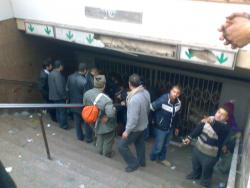 February 3rd – Detention Place Demonstrators Use to Keep Thugs and Security they Catch – Photo: RamyRaoofMubarak
February 3rd – Detention Place Demonstrators Use to Keep Thugs and Security they Catch – Photo: RamyRaoofMubarak
mobilised the forces of the counter-revolution in an attempt to crush
the Revolution by force. At the same time he made soothing speeches
offering peaceful reforms. This speech had an effect on the minds of the
inert mass of the population, especially the middle class who are
fearful of disorder. “If you remove me there will be chaos, like Iraq,”
he tells them. Such arguments can have an effect on the more backward
strata of the masses. They have not yet begun to move. They are not on
the streets. They are watching events on the television and they are
worried. By promising reform and a return to normality, the President
was telling these people what they wanted to hear.
After the speech many of people who were initially sympathetic to the
protesters were saying: “That is enough! You have got what you wanted.
The old man is going to stand down in September. Why can’t you wait a
few months? We are tired of all this. We want a peaceful life, with the
shops and banks open and business as usual.” This was a dangerous moment
for the Revolution. The mood of the middle classes was swinging towards
the President. The counter-revolutionaries were gaining ground on the
streets. The army was passive. At this point, the whole process could
have begun to go into reverse.
At this critical point, the fate of the Revolution was determined by
the courage and determination of the advanced guard. It is true that the
active forces of the Revolution were a minority. But it is equally true
that the shock troops of the counter-revolution were a minority. In
order to defeat the Revolution, Mubarak summoned every last ounce of his
support. He bussed in people from the provinces and they concentrated
their strength outside Tahrir Square.
This was the decisive turning point. If they had succeeded in driving
the protesters from the Square the whole process could have been thrown
into reverse. But they failed. Not only were they driven back by the
heroic resistance of the revolutionaries. After seven hours of fighting
for every inch, the revolutionaries finally got Mubarak’s thugs on the
run. This was a decisive turning point. This produced a change in the
psychology of the wavering elements. The ferocious violence of the
counter-revolutionaries produced a new swing in public opinion that may
well prove fatal to Mabarak’s cause.
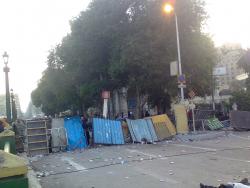 February 3rd – Fences to guard entrance to Tarhir Square – Photo: RamyRaoofThe
February 3rd – Fences to guard entrance to Tarhir Square – Photo: RamyRaoofThe
battle was live on Al Jazeera, and millions of people could see what
was happening. The scenes of a police van hurtling down the street at
top speed, mowing down demonstrators said it all. The same people who
had illusions in Mubarak’s promise of reform could now see they had been
deceived. The smiling mask of the Father of the People slipped to
reveal the ugly physiognomy of a cruel and despotic Pharaoh.
So it was all lies, after all! Mubarak’s warning of chaos if he
stepped down was contradicted by these images. The chaos already exists,
and the President is responsible. Down with the President! Al Jazeera
reported one case that explains the process whereby the consciousness of
the masses is transformed in a revolution. A man came to Tahrir Square
and said: “I believed that the protesters were paid by foreign powers,
but now I have come here and seen for myself I have understood that it
is not true.” And this man, who only yesterday was supporting the
counter-revolution, joined the demonstration.
Crisis of the regime
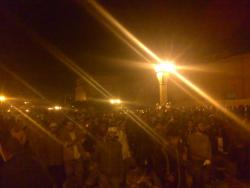 February 2nd – Protesters gathering to defend demonstration – Photo: RamyRaoofThe
February 2nd – Protesters gathering to defend demonstration – Photo: RamyRaoofThe
defeat in Tahrir Square has provoked a crisis in the regime. In a clear
expression of weakness the government is publicly apologising for
bloodshed on Wednesday. There are signs of divisions at the top. Ahmed
Shafiq, the new prime minister, said he did not know who was responsible
for the bloodshed. That is exceedingly strange because everyone else in
the world knows that it was the work of undercover police. He also said
the Interior Minister should not obstruct Friday’s peaceful marches.
For his part, the Interior Minister denied that his men ordered their
agents or officers to attack the demonstrators, although not even his
own mother believes him.
There are indications that the 82 year old President, who remains
hidden inside his heavily guarded palace, is tired and partly
demoralised. Yesterday he told the American TV network ABC News.: "I am
fed up. After 62 years in public service, I have had enough. I want to
go." But he immediately added: "If I resign today, there will be chaos."
Speaking in the presidential palace, with his son Gamal at his side,
Mubarak said: "I never intended to run [for president] again," Mr
Mubarak said. "I never intended Gamal to be president after me." Since
everybody in Egypt knows that these were precisely his intentions, this
shows that the old man at least does not lack a sense of humour. He then
repeated his long-held assertion that the Muslim Brotherhood would fill
the power vacuum left by his absence.
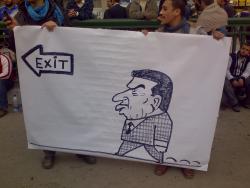 Photo: RamyRaoofThe
Photo: RamyRaoofThe
government gives the impression of struggling to regain control of
events that are slipping out of its hands. It also does not seem to know
what it is doing. While Mubarak utters dark warnings about the Muslim
Brotherhood, his prime minister is inviting the Muslim Brotherhood to
talks, a very kind offer which the latter have politely declined. They
are not so stupid as to offer a hand to a drowning man who only wishes
to pull them into the water to keep him company as he goes under.
The Americans are constantly repeating this argument that this is an
Islamist movement led by the Muslim Brotherhood and that if Mubarak goes
the jihadis will take over. That is a lie, although American
diplomats and politicians are stupid enough to believe it. This movement
has nothing to do with jihadi fundamentalism or Islamic politics. The New York Times correctly pointed out: “For many, the Brotherhood itself is a vestige of an older order that has failed to deliver.”
This great revolutionary movement was not organised by the Muslim
Brotherhood or any of the bourgeois political parties. The Muslim
Brotherhood is well organised and has a strong apparatus and money. Its
leaders are manoeuvring behind the scenes. But the youth movement is the
largest and most determined component of the revolution. It is they who
have played the leading role from start to finish.
When these courageous young men and women went to the streets on 25th
January, all the political parties including the Brotherhood were taken
by surprise. The Muslim Brotherhood did not support them. The youth of 6
April are the ones calling for action. They are the ones who called
today’s demonstration. And today, when the revolutionary people marched
in their millions, every political party including the Brotherhood were
negligible.
The revolutionary people are not fighting for Islam or any religion.
They are fighting for their democratic rights and for national and
social liberation. Under Mubarak Islamic extremists murdered Christians.
But on the demonstrations Christians and Muslims march together. In
Tahrir Square there are Muslims and Christians, believers and
unbelievers – all united in the same struggle against the same
oppressors. The Revolution has cut across all sectarian divisions. That
constitutes its great strength.
A “meaningful transition” – to what?
The immediate threat of counter-revolution has been defeated by the
courage and determination of the revolutionary people. But victory has
not yet been won. The ruling class has many ways of defeating the
people. When state violence fails, it can resort to trickery and
deception. The situation is very clear. Mubarak cannot control Egypt.
Either he will leave, or the Revolution will sweep all before it. This
prospect is what fills the Americans with terror.
Washington has lost its grip on events. Taken by surprise at every
stage, they lack even the semblance of a coherent policy. The CIA, Saudi
Arabia and the Israelis want Mubarak to stand his ground, not out of
any personal loyalty, but to prevent the Revolution from spreading to
other Arab countries. But the Americans are playing a double game. Obama
and the State Department can see that Mubarak’s days are numbered and
are manoeuvring behind the scenes to maintain the old regime under
another name.
It has emerged that the White House has been in talks with the Cairo
government about how Egypt can begin making a "meaningful transition".
US Vice-President Joe Biden spoke to his Egyptian counterpart on
Thursday; one day after Suleiman had similar talks with Secretary of
State Hillary Clinton. According to the New York Times among the
proposals was a plan for Mubarak to resign immediately and hand power to
a military-backed interim government under Mr Suleiman.
Neither the White House nor the State Department have directly denied
the report. But a spokesman for President Barack Obama’s National
Security Council said it was "time to begin a peaceful, orderly and
meaningful transition, with credible, inclusive negotiations". However,
the BBC’s Mark Mardell in Washington says other reports suggest the US
plan has already been rebuffed in Egypt, and that the administration has been “surprised” by the attitude of the military and Suleiman.
The Americans know very well that Suleiman was involved in the
attacks on the opposition, and yet they consider that he is the right
man to lead an interim government. Everybody knows Omar Suleiman is the
man of the CIA and of Israel. This is just a means of maintaining the
system while giving the impression of a change. It would be the negation
of all the democratic aspirations of the people: a lie and a cynical
deception.
What the people want
In Tahrir Square today there is a placard that reads: “THE PEOPLE WANT THE DOWNFALL OF THE SYSTEM” Note the exact wording: not just the downfall of Mubarak, but the downfall of the entire system upon which he rests.
The people read out a list of all the present political leaders and
after each name shouted out: “Illegitimate!” That is a warning to the
politicians that they will not accept any deals that involve the
inclusion of any figure from the old regime. This shows an absolutely
correct political instinct.
The problem is one of leadership. The bourgeois liberals cannot be
trusted. The men who are trying to usurp control are like merchants in a
bazaar who will use the Revolution as a bargaining piece with which
they can haggle with the regime to win positions and careers. They will
always betray the people to further their own selfish interests. The
Wafd party and other liberals immediately accepted Mubarak’s
"concessions" and ended their participation in the revolution.
Al-Baradei is a stooge of the Americans who Washington wishes to put in
power as a replacement of Mubarak. How can we place any confidence in
men like these?
The revolutionaries must be on their guard! The people of Egypt did
not fight and die to allow the same old oligarchy and their imperialist
backers to stay in power. The movement must not be demobilised. It must
be stepped up. The Revolution must be carried on to the end! No deals
with Suleiman or any other figure of the old regime! Not a single one
must remain!
The revolutionary people must take a big broom in their hands and
sweep out the entire political establishment. For a wholesale purge and
the dismissal of all the old officials! Those guilty of corruption must
be put on trial and their property confiscated and used for the benefit
of the poor.
As long as the old apparatus of state repression remains in being the
Revolution will never be safe. The people can accept nothing less than
the complete dismantling of the old state apparatus. For the immediate
disbanding of the repressive apparatus! For the establishment of popular
tribunals to try and punish all those guilty of repressive acts against
the people!
The Revolution must be organised. It needs structured, democratic,
popular organisations and a fighting machine able to defend it against
any aggression. For popular committees for the defence of the
Revolution! For a people’s militia! Once the people are armed, no force
on earth can oppress them.
The armed people are the only force that can guarantee the conquests
of the Revolution, defend democratic rights and convene genuinely free
elections to a Constituent Assembly.
A proud people awakes
The New York Times yesterday published interviews that reveal the real content of the Revolution:
“I tell the Arab world to stand with us until we win our freedom,”
said Khaled Yusuf, a cleric from Al Azhar, a once esteemed institution
of religious scholarship now beholden to the government. “Once we do,
we’re going to free the Arab world.”“For decades, the Arab world has waited for a saviour — be it Gamal
Abdel-Nasser, the charismatic Egyptian president, or even, for a time,
Saddam Hussein. No one was waiting for a saviour on Wednesday. Before
nearly three decades of accumulated authority — the power of a state
that can mobilise thousands to heed its whims — people had themselves.“I’m fighting for my freedom,” Noha al-Ustaz said as she broke bricks
on the curb. “For my right to express myself. For an end to oppression.
For an end to injustice.”
Mubarak is justly regarded as a traitor and an American and Israeli
stooge. The same sentiment is shared by many parts of the Arab world.
The same conditions that provoked revolution in Tunisia and Egypt will
cause a domino effect across other Arab states. That is why the demands
of the Egyptian people have found an echo in the streets from Algeria to
Morocco, from Palestinian camps in Jordan to the slums of Baghdad’s
Sadr City.
Cynical western observers have often described the Egyptian people as
apathetic and passive. Now this stereotype, the product of superficial
thinking and feelings of racial superiority, has been stood on its head.
Where is the apathy now? This is an ancient, proud and noble people who
were exploited, oppressed, insulted and humiliated for generations by
foreign masters and their corrupt local agents. They are in the process
of breaking with the past and building a new and better future.
The Revolution has given a voice to those who had no voice, it has
articulated the sense of hopelessness, the frustration, the humiliations
at the hands of the police and the outrage of the youth who do not have
enough money to get married and raise a family. The masses are not just
fighting for bread and elementary human rights. They are fighting for
human dignity. Thanks to the Revolution, the people of Egypt have stood
up and raised themselves to their true stature.
“From minute-by-minute coverage on Arabic channels to conversations
from Iraq to Morocco, the Middle East watched breathlessly at a moment
as compelling as any in the Arab world in a lifetime. For the first time
in a generation, Arabs seem to be looking again to Egypt for
leadership, and that sense of destiny was voiced throughout the day.”
These words of the New York Times show the real situation. All this
is having a tremendous impact that extends far beyond the Middle East
and North Africa. Revolutionary Egypt can now begin to occupy its real
place in world history.
